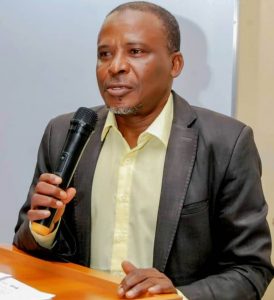By Y. Z. Ya’u

Mallam Y Z Ya’u:, the author
My grandfather lived on the banks of the Jamaare River, earning his keep. During the raining season, he grew corn, sugarcane, and maize. In the dry season, he focused on tomatoes, sweet potato, vegetables and melon. The river banks were not only our play ground but also a school of sort and a central point of the economy of the community. On the banks we learned about flora and fauna: names of plants, birds, and weather much more than we were taught in the school. We learnt how to predict the weather. We knew the different patterns of the flow of the river and from that we could predict whether there could be a flood or the water will remain within its banks. And with that knowledge, folks knew what do and couldn’t be caught unprepared.
In spite of damming, and years of siltation, floods have become more frequent and more devasting along the river course. Each year sees a gash of merciless torrent of water that floods the land, submerging farms, sweeping away the crops and often, trapping some unfortunate people who meet their untimely death. Yearly, government would promise to build flood control mechanisms along the banks of the river but never cared to do so. It seems it will always forget until the next flood.
So it was that in July this year, there was a devastating flood along the path of the Jamaare River. Over 50 communities in six local government were affected. The local governments are Shira, Jamaare, Katagum, Itsa/Gadau, Zaki and Gamawa. Hundreds of hectares of rice and other crops were lost in addition to many other crops such as corn, maize, etc. Many houses were destroyed and a number people lost their lives.
As if this was what the government was waiting to happen, the Federal Government made an immediate announcement that the president had approved N880,000 from the ecological fund to be used to address the problems the flood had created in Jamaare Local Government.
In a jiffy, the Bauchi State governor, not to be left out of this show of sympathy, quickly changed his travel plans by adding Jamaare in his North Bauchi Senatorial District tour and visited Jamaare. He went to the river side, wadding through water and addressing the jubilant members of the community who had gathered to hear about the relief that was going to come their way.

Bauchi governor, Bala Mohammed
He sympathized with people in ways that only politicians do, turning a solemn occasion into a rally. He said all the things to be said about climate change, about the politics of damming and what was needed to arrest flooding and turned the excess water into a regional supply scheme to meet the domestic needs of the communities. He informed the gathering about what they already heard: that the president had approved N880,000 for relief operation. This revolves around three different works. First, there would be flood control mechanisms along the banks of the river; second, there would be the renovation of the main market which was largely destroyed by rains and, lastly, the constructions of flood controls along the banks of the river and actual relief support/assistance to victims of the flood. Everybody clapped and left happy with the governor entering his jeep, beaming with smiles that he had won the hearts of the community.
More than two months now since the governor’s sympathy visit, there is no sign of the presidential promise of relief and support for the victims of the flood disaster. Those who have lost their crops and had looked up to the president for relief have been painfully disappointed. Similarly, no relief has been forthcoming for those whose houses were destroyed. The principle of release is that it must come timely, at the time that victims are at their weakest point of vulnerability and still searching for ways to cope with the adversity that had befallen them. Now that many of the farmers have shown a high level of resilience, bouncing back from this adversity, some will not care a penny about the promises not delivered.
If individually the flood victims have not benefited from the promise of the relief operations of the government, the community itself as a whole has not seen it. One of the projects the president had promised them was the reconstruction of the Jamaare main market which was partly affected by the torrential rains that ignited the flood. Till date, no sign of work is seen around the market. Thankfully for the traders, the raining season is almost coming to an end.
As I walk on the streets of Jamaare and listen to anguish in the conversation of the farmers, one word stood out. It is ‘Sai Maigaskiya’. Jamaare community has seen a different side of Sai Maigaskiya, which is that Maigakiya has made promises that he has failed to redeem. A key element of a Maigaskia persona is that a leader must be accountable for his or her words. Promises are meant to be delivered, and not for media attention, ending with some catchy headlines. Buhari has failed to live up his words and to the basic element of Maigaskiya.

Is the ‘Sai Maigaskiya’ narrative ruptured?
So, where is the money? Could it be that it has been released and stolen by someone? This is not unusual in Nigeria where impunity has no limit. But such impunity is only possible where government thinks that governance starts and ends with statement for the media. Otherwise the president ought to ask his aides serious questions.
Is it possible that the president does not know what his appointees are doing? It is instructive that the president has created a new ministry specifically to deal with relief and emergency issues. Is the Minister of the Humanitarian Affairs not aware of the disaster that had befallen Jamaare Community or is it that she is not aware of what the president had promised the community? Or even more, is it that the president has not remembered to direct the ministry to act on his promises? Whatever is the case, one thing is certain about this government which is that it lacks internal coherence. There appears to be no capacity for coordination between the different units of the government. The president simply makes statements without caring to know if there is a responsive mechanism that will translate the president’s words to action.
Well, this actually is not correct because when the president was rattled with the promise of a social media revolution by Sowere (who couldn’t get a million votes in the presidential election), the president’s missing mechanism for action was proactively prompt in arresting and detaining the young activist. Similarly when Chido Onumah wore his t-shirt that offended the sensibility of the president, the missing mechanism was at hand to arrest and make Onumah remove this offensive shirt that has the same inscription as the book he authored and published (we are waiting when they will match to seize all copies of the book that has the same message as the t-shirt).
In this case, it is clear that it is not that the president lacks the mechanism to translate his words into action and reality. The reality is that the mechanism works not on the basis of the words of the president but on his body language, which they decode by seeing which words the president wants translated into action and which are to be left for the dust bin of history.
Consistently, even when Buhari had appeared un-elective, the people of Jamaare have voted him overwhelmingly. The flood along the banks of the Jamaare river has swept a great deal of goodwill for the president. I have the feeling the people have been used and dumped. The president has misused the trust the community invested in him. He has eroded the confidence they have in him. Yet it is not too late for him to redeem himself. But, can he? Will he?
Mallam Y. Z Ya’u, the author, is of the Centre for Information Technology and Development, (CITAD), Kano




























